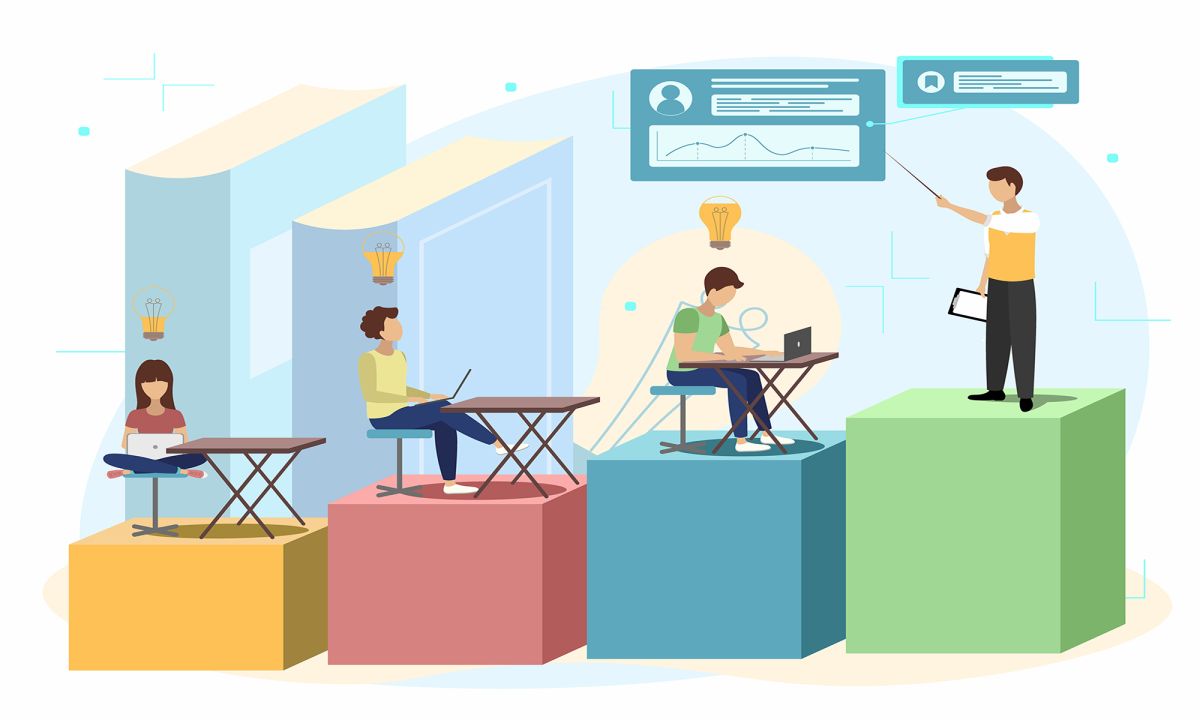eNews, Technology
Upskilling in an AI-driven job market
Artificial intelligence (AI) has revolutionized the job market in recent years, spawning roles like data analysts, machine learning engineers and AI ethicists. To thrive in their positions, employees must exhibit a blend of both technical and soft skills.

Artificial intelligence (AI) has revolutionized the job market in recent years, spawning roles like data analysts, machine learning engineers and AI ethicists. To thrive in their positions, employees must exhibit a blend of both technical and soft skills.
Why it matters: By upskilling and reskilling, employees can sharpen their skills and stay on top of the latest industry trends and technologies, enhancing productivity and efficiency.
Artificial intelligence is expected to create 97 million new jobs, according to the World Economic Forum. New roles such as AI prompt engineers, machine learning engineers and automation experts may emerge. “AI will inevitably expand the job market, focusing on technical skills and workers familiar with AI,” reads an Insight Global report.
The advent of AI in the workplace has resulted in a division of labor where AI handles routine, analytical tasks while humans focus on areas requiring creativity, judgment and emotional intelligence, according to a US Data Corporation. “This new dynamic elevates the value of soft skills as critical differentiators in the workforce,” the article reads.
By the numbers: According to an Intelligent.com report:
- Four in five employers value experience over education when evaluating job candidates.
- 45% of companies plan to eliminate bachelor’s degree requirements for some positions in 2024.
- 55% of companies eliminated bachelor’s degree requirements in 2023.
- 70% say they eliminated bachelor’s degree requirements to create a more diverse workforce.
Remaining relevant and competitive requires continuous learning and skill development through upskilling and reskilling.
Upskilling is a workplace trend that offers training and development to enhance employees’ skills and reduce skill gaps. It aims to boost existing employees’ abilities, enabling them to progress in their roles and explore new opportunities within the company.
Reskilling involves training employees in an entirely new set of skills to prepare them to take on a different role within the company. This typically occurs when workers’ previous tasks or responsibilities become irrelevant, often due to advances in technology.
What they’re saying: “I’ve started putting a little more weight on flexibility, willingness to learn and drive,” said Martine Dyer, CCE, CCRA, credit and collections manager at Restaurant Equipment Service Group, LLC (Addison, IL). “A person’s willingness to complete tasks and solve problems is more valuable than technical skills or experience, as these traits facilitate faster learning. Despite training, acquiring soft skills can often be more challenging.”
Dyer’s HR department offers training programs for both technical and soft skills to their employees. The program includes five-10-minute educational videos followed by a quiz.
“There, you can learn about communication and interpersonal skills such as how to effectively provide feedback during performance evaluations,” Dyer said. “I think if there is a desire from the employee to learn and grow, the company should support it. Whether that’s earning a degree or a designation from NACM’s Professional Certification Program.”
Eve Sahnow, CCE, director of credit at OrePac Building Products (Wilsonville, OR), continuously evaluates the need for upskilling and reskilling to address any emerging skill gaps. “For upskilling, we offer regular training programs and workshops to enhance their current skills and keep them updated with the latest industry trends,” she said. “We identify and train employees interested in transitioning to different roles within the company.”
When credit professionals know how to use more automated tools, work will be more efficient. Merry Duan, senior strategic account analyst at Bayer Corporation (Saint Louis, MO), ensures that her employees are upskilling or reskilling to improve work efficiencies and knowledge as they work in a highly competitive environment.
“For example, I interpreted that artificial intelligence (AI), machine learning (ML) and ChatGPT can help my daily work,” Duan said. “So, I went to several webinars and discussion forums hosted by LinkedIn and other educational organizations for AI and machine learning training. Recently, I got certified for AI machine learning, which supports financial planning and analysis.”
Training and development have a direct impact on employee engagement and retention and should be an integral part of your talent management strategy. It makes employees feel supported, valued and capable, resulting in improved performance.
“Investing in employee development fosters a culture of continuous learning and growth within the company, leading to higher employee satisfaction and retention rates,” said Joshua Nolan, CCE, senior director of financial operations at PrePass (Phoenix, AZ). “From a company perspective, having a skilled and adaptable workforce improves overall performance, innovation and competitiveness in the market.”
In his upskilling approach, Nolan ensures he regularly conducts training programs to enhance his employees’ proficiency in new technologies or industry trends. “If an employee expresses an interest in transitioning to a different role within the company, we provide them with the necessary training and resources to acquire the required skills, an example of reskilling.”
Chris Kyriakopoulos, CICP, national credit risk manager at Robert Half International (Phoenix, AZ), says that he incorporates discussions about upskilling into quarterly, midyear and annual performance reviews to ensure that it remains a priority for everyone involved. “By regularly assessing skills gaps and setting goals for improvement, both employees and managers can work together to create personalized development plans that align with both individual aspirations and organizational objectives.”
Reskilling can be used when transitioning employees to a different position within the company. For some credit managers, this training involves higher education and hands-on experience in similar roles.
Melvin Ucelo, CCE, CICP, corporate credit manager at Parker Hannifin (Cleveland, OH), is training an employee who is moving from deductions to credit. “Previously an AR analyst, she showed advanced problem-solving skills,” he said. “We’re supporting her pursuit of an accounting degree as it will unlock numerous opportunities, presumably leading her towards credit.”
As technology continues to shape the job market, companies must prioritize continuous learning and development to equip their employees with the necessary skills for success in evolving roles and industries.
“A team member of over two years recently expressed an interest in data analytics and Power BI,” said Val Hardesty, CCE, CICP, director of credit at Vallen (Belmont, NC). “So, she’s been meeting with the Power BI reporting team to learn more about those interests. By allowing this, we’re not only retaining employees, but we’re placing top talent elsewhere in the company, which will most likely happen with this employee.”
Brendon Misik, CCE, CICP, senior manager for agriculture credit at PCS Admin USA Inc. (Nutrien) (Deerfield, IL), is in a similar situation with another employee who is interested in IT and Power BI. “He’s our most valuable asset to the credit department,” he said. “He puts together these amazing Power BI reports to help everybody from Treasury to the CFO. Now he’s working on automating our reviews for our accounts so that we may focus our energy on more urgent matters.”
Whether you’re reskilling or upskilling, your employees’ professional development is key to improving their productivity and well-being. “I think it’s important for all employees to upskill because it continues to fuel your passion and purpose at the workplace,” Dyer said. “Regardless of your experience level, the additional tools or skills learned will make goals more attainable and ultimately, make the company better.”
The bottom line: In the evolving AI-driven job market, continuous upskilling and reskilling are crucial for employees to remain relevant and competitive, with an increasing emphasis on both technical and soft skills.





